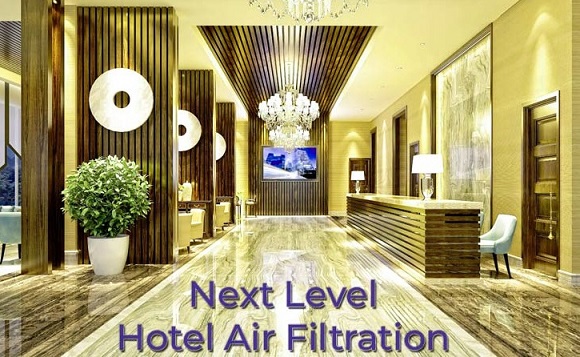Bangkok Hotels Failing to Embrace Clean-Air Solutions Despite Impending Pathogenic Outbreaks And COVID-19 Surges
Nikhil Prasad Fact checked by:Thailand Medical News team May 22, 2025 8 months, 3 weeks, 1 day, 21 hours, 2 minutes ago
As the global hospitality sector slowly adapts to the harsh realities laid bare by the COVID-19 pandemic, hotels in Bangkok remain worryingly behind the curve when it comes to clean-air initiatives. While international awareness around airborne pathogens and indoor air quality has surged, most Bangkok establishments have not taken decisive action to future-proof their ventilation and purification systems. This article is based on an earlier warning in the new website:
Bangkok Hotel News by the same author.
Despite overwhelming scientific consensus about the need for enhanced air control indoors, a staggering 97% of hotels worldwide—including the majority in Bangkok—have yet to adopt full-spectrum clean-air protocols. Many local hotels still operate with outdated HVAC systems and lack any advanced air-cleaning technologies, exposing guests and staff to significant health risks.
 Bangkok Hotels Failing to Embrace Clean-Air Solutions Despite Impending Pathogenic Outbreaks And COVID-19 Surges
Bangkok Hotels Failing to Embrace Clean-Air Solutions Despite Impending Pathogenic Outbreaks And COVID-19 Surges
Worst still, will the threat of a potential H5N1 outbreak or even the current new COVID-19 Surges in Thailand, China, Taiwan, Hong Kong, Brazil etc, most hotels have not learnt their lessons to include clean-air strategies into their most-must- have lists or priorities.
Why Clean Air Matters More Than Ever
The science supporting improved indoor air hygiene is now indisputable. Yet, Bangkok hotels seem reluctant to invest in long-term protection. Clean-air measures aren’t just trendy upgrades—they are scientifically proven defenses against the spread of airborne illnesses. Essential technologies include:
-
True HEPA Filtration – These filters remove at least 99.97% of airborne particles down to 0.3 microns, including viruses, bacteria, and fine dust.
-
Far-UVC Lighting Systems – Using a specific wavelength (222 nm), Far-UVC can destroy viruses and microbes safely in populated areas without harming humans.
-
Ozone-Based Sterilization – When used properly, ozone purifiers break down volatile organic compounds and deactivate microbial threats. However, precise calibration is crucial to ensure occupant safety.
-
Active Ventilation Upgrades – Enhanced air exchange and reduced recirculation lower the risk of concentrated airborne pathogen buildup.
-
Air Ionization and Bipolar Ion Systems – These technologies use charged ions to bind and neutralize airborne pollutants and microorganisms.
These methods, while diverse in mechanism, converge on one shared benefit: safer, cleaner indoor environments.
A Global Wake-Up Call Hotels Ignore
Some hotel chains abroad have stepped up. Marriott, for example, introduced hospital-grade disinfection including UV sanitization tools. Hilton, collaborating with experts from Lysol
and the Mayo Clinic, added air quality controls to their cleaning regimes. Even budget chains in regions like South Korea and Germany have begun integrating smart ventilation and filtration systems.
By contrast, Bangkok's hospitality scene has seen limited progress. A handful of luxury properties tout air purifiers in suites or public areas, but these measures are often superficial and lack system-wide integration. Most mid-tier and boutique hotels remain complacent, failing to deploy meaningful changes beyond superficial hygiene marketing.
The Dangerous Overlap: Air Pollution and Pathogens
Bangkok already suffers from chronic air pollution, particularly dangerous levels of PM2.5 particulates during seasonal smog surges. In early 2025, the city recorded hazardous air quality levels, forcing schools to shut and prompting health warnings across media platforms. Poor outdoor air exacerbates the health burden indoors when proper filtration isn't in place.
Airborne viruses thrive in such conditions. Travelers with respiratory issues, seniors, or immunocompromised individuals are especially vulnerable. Hotels, as transit hubs for international guests, are potential flashpoints for pathogen transmission—which makes the lack of air purification strategies particularly reckless.
Cost Concerns vs. Long-Term Returns
Many hoteliers cite cost as the primary obstacle to upgrading air systems. However, this shortsightedness ignores the economic toll of avoidable outbreaks: closures, lawsuits, bad publicity, and lost bookings. In contrast, marketing a hotel as "clean-air certified" could boost reputation, attract wellness-focused tourists, and enhance guest retention.
Governments and industry associations can play a vital role by offering subsidies, low-interest loans, or technical consulting to help hotels implement necessary overhauls. Coordinated campaigns could establish air-quality certification standards, much like energy-efficiency ratings or hygiene seals.
The Industry Must Reinvent Its Approach to Safety
Bangkok’s hospitality sector stands at a crossroads. The COVID-19 pandemic exposed gaping holes in infrastructure preparedness. Ignoring the call to modernize indoor air standards is not just a missed opportunity—it’s a gamble with public health.
Operators should conduct urgent audits of their HVAC systems, assess airflow rates, and begin integrating proven technologies such as HEPA filtration, Far-UVC lights, and intelligent ventilation controls. Transparency matters too: hotels that clearly communicate their clean-air strategies will gain trust in an increasingly cautious travel market.
Air is the invisible currency of indoor safety. As other global cities race to upgrade, Bangkok cannot afford to fall behind. The era of "good enough" ventilation is over. If hotels wish to survive the next pandemic, the time to act is already running out.
For the latest about
Clean-Air strategies, keep on logging to Thailand Medical News.
Read Also:
https://bangkokhotel.news/hotels-in-bangkok-have-not-adopted-clean-air-strategies-to-deal-with-future-pandemic-outbreaks-involving-airborne-pathogens 